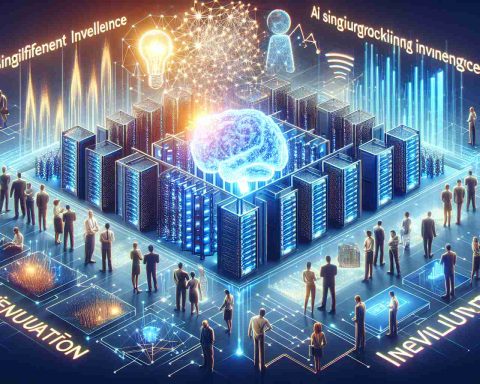According to a recent report from the International Monetary Fund (IMF), several Southeast Asian nations are facing challenges with rising unemployment rates. Notably, Thailand and Singapore boast the lowest unemployment figures, at 1.1% and 1.9%, respectively, while Vietnam sits at 2.1%. Other nations like Malaysia, the Philippines, and Indonesia reflect higher unemployment rates at 3.5%, 5.1%, and 5.2%, respectively.
Despite these hurdles, specific industries are witnessing robust growth, particularly in sectors like AI, e-commerce, and healthcare. The advent of artificial intelligence is profoundly influencing the job market, enabling companies to streamline operations and enhance consumer engagement. For instance, an innovative marketing initiative in Singapore employed AI to optimize the promotion of Pizza Hut, effectively reducing the manpower needed and ensuring cost efficiency.
Amidst this transition, large tech firms are recognizing the potential of Southeast Asia. Corporations such as Apple and Google are investing significantly to expand their market presence. AI is not only transforming operational capabilities but also refining recruitment practices. Reports suggest that embracing AI could lead to the automation of various roles, prompting concerns about job displacement, particularly in countries heavily reliant on administrative positions.
Furthermore, AI’s role in promoting workplace diversity is becoming increasingly prominent. By mitigating gender biases in hiring, AI technologies aim to enhance recruitment fairness, supporting a more inclusive workforce. As new job categories emerge from technological advancements, the labor landscape in Southeast Asia may evolve in unexpected and significant ways.
The Future of Employment in Southeast Asia Amidst AI Integration
As Southeast Asia stands on the brink of a technological revolution spurred by rapid AI integration, there are numerous dimensions to consider regarding its future employment landscape. While previous discussions highlighted unemployment rates and specific growth sectors, a broader examination of the potential impact and implications of AI on employment is essential.
Key Questions Regarding AI’s Role in Employment
1. What specific jobs are most at risk of being automated in Southeast Asia?
Reports suggest that jobs in manufacturing, basic data entry, customer service, and routine administrative functions are particularly vulnerable to automation. For instance, a study by McKinsey estimates that up to 45% of current work activities could be automated using existing technologies.
2. How will AI integration create new job opportunities?
The rise of AI is expected to forge new job categories in tech development, data analysis, and AI maintenance. Moreover, sectors like health tech and green technology could yield innovative roles that align with new economic needs.
3. What strategies should nations adopt to mitigate job displacement?
Upskilling and reskilling initiatives are critical. Programs focusing on digital literacy, vocational training, and STEM education can prepare the workforce for an evolving job market.
Challenges and Controversies of AI Integration
The transition to an AI-integrated economy is not without its challenges. A significant concern lies in the disparity between urban and rural job markets. Urban areas tend to receive more investments in technology, thus benefiting from new job creation, while rural regions may experience greater job losses without sufficient support or training resources.
Moreover, ethical considerations arise regarding AI decision-making in hiring processes. Biases in AI algorithms can unintentionally perpetuate discrimination if data sets used for training are not diverse. Ensuring transparency and fairness in AI applications is paramount to fostering equitable employment opportunities.
Advantages of AI Integration in Employment
1. Increased Efficiency: AI can significantly streamline operations, allowing businesses to allocate resources more effectively and minimize costs. This efficiency can lead to enhanced productivity and economic growth.
2. Improved Job Quality: By automating repetitive and mundane tasks, AI allows human workers to focus on more engaging and complex aspects of their jobs, potentially leading to greater job satisfaction.
3. Support for Decision-Making: AI tools can aid businesses in making informed decisions based on data analysis, leading to better strategic outcomes.
Disadvantages of AI Integration in Employment
1. Job Displacement: The automation of tasks may lead to significant job losses, particularly for low-skilled workers who may not have the resources to transition to new roles.
2. Income Inequality: The benefits of AI integration may favor high-skilled workers while leaving low-skilled workers behind, exacerbating existing economic disparities.
3. Dependency on Technology: As businesses rely more on AI, there is a risk of reduced human oversight, which can lead to errors or ethical lapses in decision-making processes.
Conclusion
The integration of AI into Southeast Asia’s labor market presents both opportunities and challenges. As the region marches towards an AI-driven future, it is crucial for governments, businesses, and educational institutions to collaborate on initiatives that promote workforce development and inclusivity. A proactive approach will be essential to ensuring that the benefits of AI are shared widely rather than exacerbating existing inequalities.
For further insights on employment trends and technology, you can visit the following links: World Bank, World Economic Forum, International Monetary Fund.

















